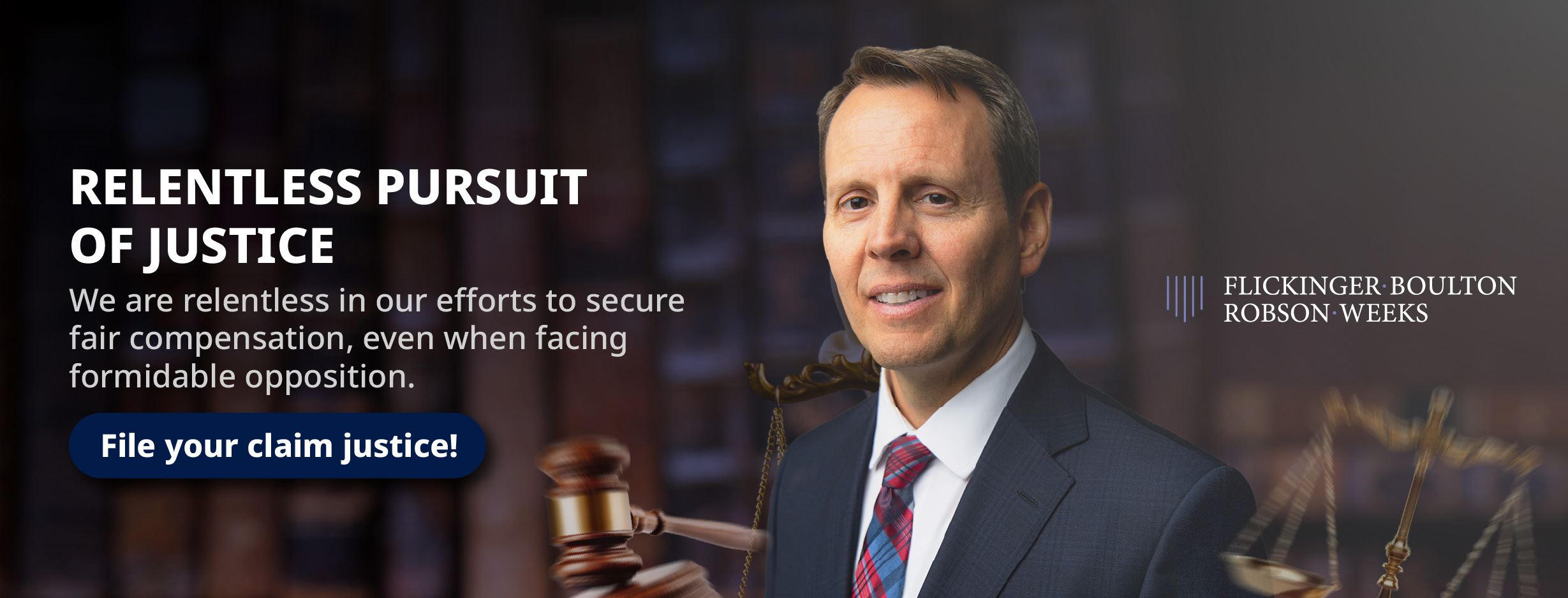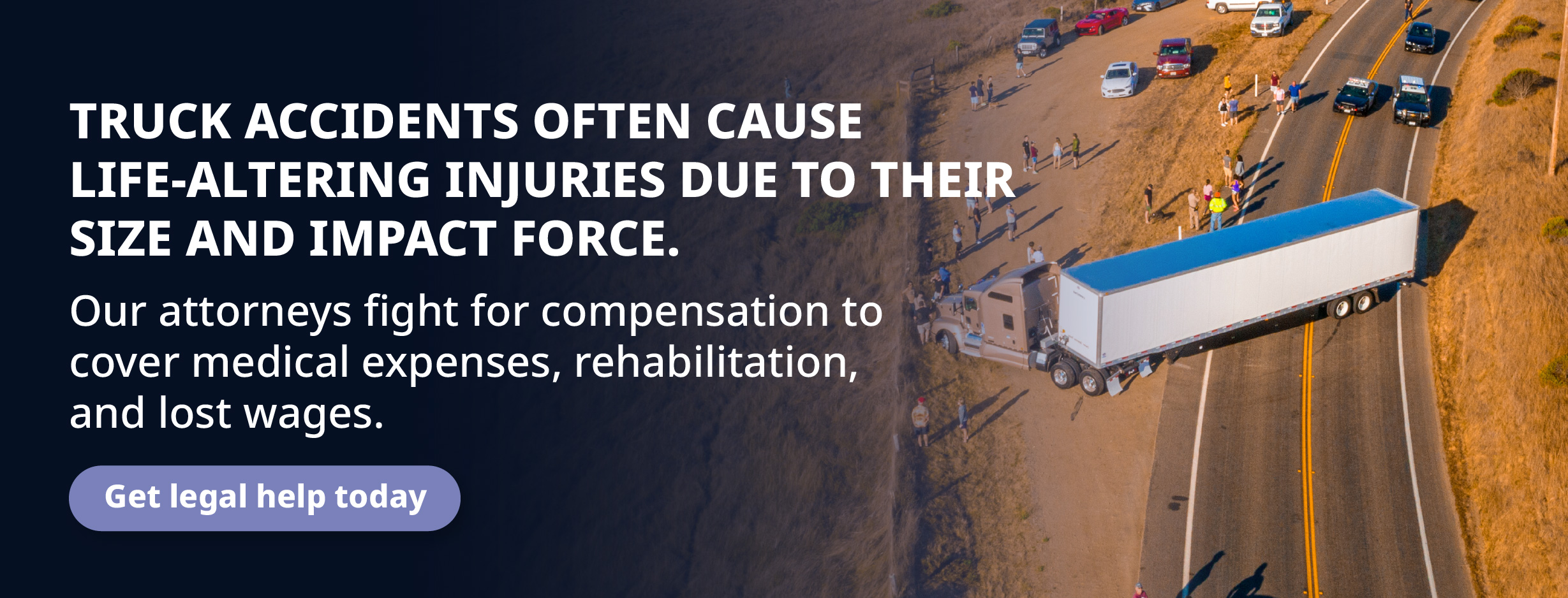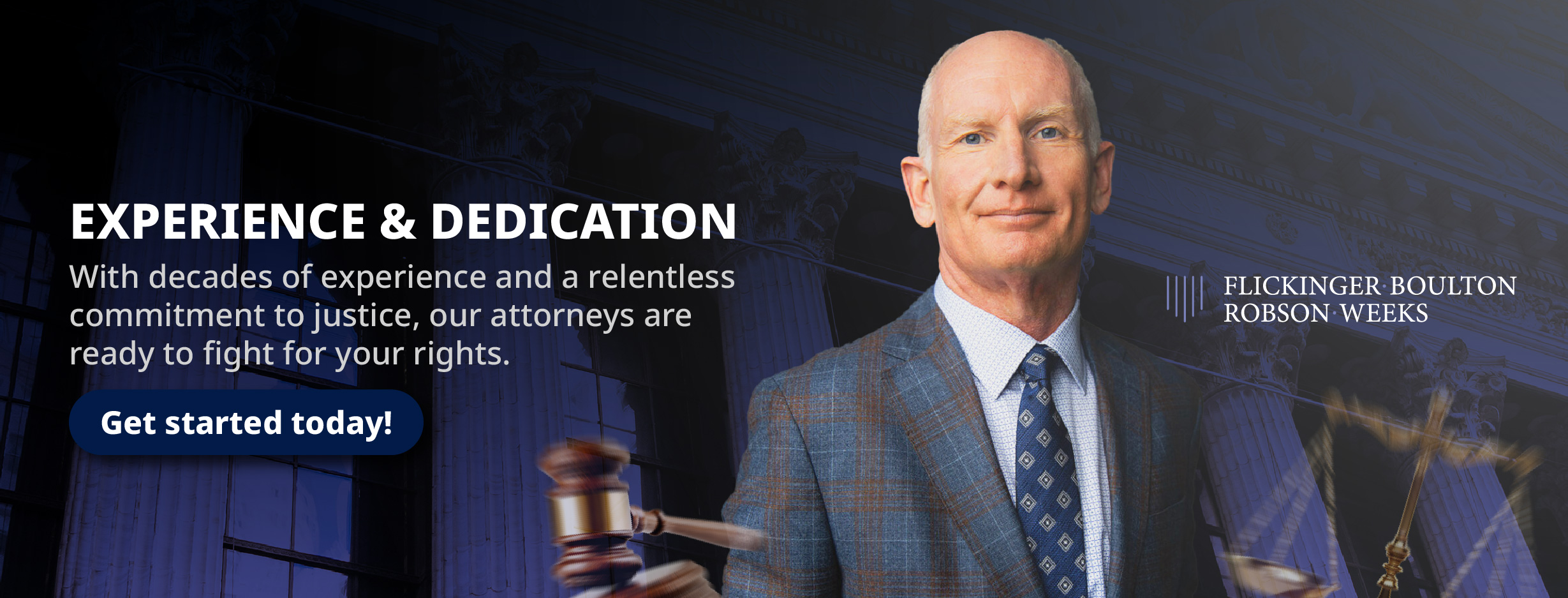Driving through the breathtaking red rock landscapes of St. George, you might not think twice about sharing the road with a massive commercial truck. But in an instant, everything can change. A routine drive can turn into a life-altering accident, leaving you injured, overwhelmed, and uncertain about what comes next.
Suddenly, you’re facing not just physical pain but the stress of mounting medical bills, missed work, and the emotional toll of it all. And if the accident was caused by a careless truck driver or a trucking company pushing unsafe deadlines, the frustration can be even greater.
The aftermath of a truck accident can feel incredibly unfair, especially when it seems like the odds are stacked against you. Maybe you’ve heard stories of people struggling to get a fair settlement after a crash, or you’ve seen reports of devastating truck accidents in Utah. But here’s the good news: you don’t have to go through this alone.
At Flickinger Boulton Robson Weeks, we know just how challenging this process can be. With a strong track record of securing major personal injury settlements, our team is here to fight for the compensation you deserve. Located near West Jordan, we’re ready to stand by your side and help you move forward.
In this article, we explore common causes of such crashes in St. George, Utah’s trucking regulations, and the steps you can take to secure the compensation you deserve. Our goal is to help you regain stability and move forward.
Numerous factors can contribute to serious truck collisions on Utah roads, including those in St. George. While drivers of passenger cars sometimes cause crashes, commercial trucks pose a heightened risk due to their size and weight. Here are some primary causes:
Federal regulations limit the hours a commercial driver can spend on the road before taking a required rest break. Even so, truckers may push themselves, often under tight delivery schedules or company pressure. Long, monotonous stretches of highway travel can trigger micro-sleeps or slowed reaction times.
Research indicates a significant portion of commercial truck crashes relate to driver drowsiness. When a fatigued driver loses concentration for even a few seconds, their massive truck can easily drift into other lanes or fail to stop in time.
If a truck’s brake system malfunctions or tires blow out unexpectedly, the consequences can be devastating. Frequent inspections and maintenance are mandated by Utah law and federal guidelines. Some trucking firms or drivers, hoping to save money, might skip or delay important repairs.
A single neglected brake pad can cause catastrophic results if the driver cannot slow down on St. George’s highways or descending roads. Similarly, poorly maintained engines or steering components can lead to sudden loss of control.
Trucks carrying cargo beyond legal weight limits or unsecured loads can become incredibly hazardous. When improperly loaded or secured, cargo can shift during transit, creating an imbalance in the truck’s weight distribution. This can cause the truck to tip over or the driver to lose control, especially while making turns or navigating curves. Additionally, trailers exert additional stress on tires and brakes, increasing the possibility of tire blowouts or brake fading on steep grades.
Shifting cargo can unbalance a trailer around turns, causing rollovers. Additionally, spilled items from an overloaded or poorly secured trailer can create secondary accidents for vehicles behind.
Beyond fatigue, truck drivers can be distracted by cargo, poor road conditions, or even the need to communicate with dispatchers. If they momentarily look away, the heavy truck can veer into another lane.
Speeding exacerbates the risk because a heavier vehicle takes longer to stop. Even traveling a few miles per hour above the limit dramatically increases braking distance, leaving less margin for error when traffic suddenly slows.
A trucking company might hire drivers without properly checking their background. If a driver with a history of traffic violations or inexperience is put behind the wheel, the chance of a serious crash escalates. Inadequate training on managing large vehicles in mountainous areas around St. George also leads to increased danger.
By pinpointing these root causes, you can more effectively show how a driver or trucking firm’s actions led to your injuries. Understanding the origins of these crashes also underscores why commercial vehicles require extra vigilance and regulation.

Accidents involving large commercial trucks do not just happen because a driver makes a single mistake. Often, a trucking firm’s internal practices, priorities, or oversight can play a significant role. In St. George and beyond, these policies might include:
These systemic issues reveal how accidents are not always the isolated fault of one driver. By investigating the firm’s internal emails, logs, or employee statements, an attorney can often find patterns of disregard. Holding the trucking company accountable encourages safer policies and potentially grants victims access to the company’s higher insurance limits.

Along with federal guidelines, Utah imposes its own trucking standards, ensuring safer operations on roads, including those that wind through St. George. These rules work in tandem with broader laws from the Federal Motor Carrier Safety Administration (FMCSA):
While interstate trucking is largely regulated by FMCSA, Utah also sets rules for operators who primarily travel within the state. Intrastate drivers might face slightly adjusted hours-of-service rules or weigh station stops.
Ensuring compliance helps keep local routes safer. If an in-state truck driver surpasses allowable on-duty hours or misses mandatory rest, that can be direct evidence of negligence.
Utah enforces maximum vehicle weights on highways and local roads. Checking weigh station logs or route permits can reveal if a rig was overloaded. Exceeding weight limits harms road surfaces and raises the risk of blowouts or inadequate braking. For mountainous St. George highways, controlling weight is particularly critical.
Special permits must be obtained when carrying loads that exceed standard dimensions. These permits may specify particular routes, restrict travel times, or require additional escort vehicles. If a driver fails to obtain these permits or deviates from the approved route and causes an accident, this violation can strengthen your claim for damages.
Some St. George areas might ban heavy trucks during certain seasons or hours if traffic or tourist events are expected. If a trucker disregards these regulations, it can jeopardize pedestrians, cyclists, and smaller cars. Evidence of the driver ignoring local rules helps illustrate how they ignored safety.
Truck drivers in Utah are subject to strict drug and alcohol testing regulations, with zero tolerance for substances that impair safe driving. Random testing is required for drivers operating commercial vehicles, and drivers are prohibited from operating a truck under the influence of drugs or alcohol. If a truck driver is found to be intoxicated after an accident in St. George, they could face criminal charges in addition to being held liable for the accident.
Officers in Washington County or near weigh stations around St. George inspect commercial vehicles to see if they meet state codes. If repeated citations appear on record, they show a pattern of disregarding safety. If you are in a collision, your attorney might gather these logs or citation histories for a stronger argument that ignoring regulations led to your crash.
By integrating these state-level guidelines with FMCSA standards, Utah aims to prevent trucks from becoming hazards. If your lawyer discovers the driver or company violated any rule, it can prove a significant leverage point in negotiations or in front of a judge and jury.

This can be complex due to the number of factors that may contribute to the crash. Unlike passenger vehicle accidents, where fault is often straightforward, truck accidents involve multiple parties, including the truck driver, the trucking company, and even vehicle manufacturers.
In St. George, a thorough inquiry and a clear understanding of how negligence or violations of safety regulations may have contributed to the accident is essential to identify who truly caused the crash for determining liability.
At Flickinger Boulton Robson Weeks, with decades of experience securing favorable outcomes for clients across various truck accident cases, we are prepared to help you navigate the particular circumstances of your case.
First, investigators check whether the driver’s behavior directly triggered the collision. Were they speeding, texting, or surpassing hours-of-service rule? If a test reveals drug or alcohol use, liability strongly points in their direction. But even if the driver evidently erred, your lawyer should review whether the trucking company contributed.
Companies overseeing scheduling, maintenance, or driver training can be accountable. If logs show that management urged the driver to skip rest breaks or if the carrier failed to fix known mechanical issues, they share blame.
The concept of “vicarious liability” might also hold the company responsible for the driver’s negligence if the driver was working at the time of the crash. The deeper you dig, the more you might find safety protocols or background checks were ignored.
Sometimes, an equipment failure triggers a crash. If a tire blowout results from a defective product, or the steering column malfunctions due to a design flaw, the manufacturer might be named. This scenario typically requires expert analysis to trace the fault back to manufacturing or design errors, rather than poor maintenance.
If a third-party garage services the truck, it may share liability if it neglected to fix major problems or installed parts incorrectly. Verifying the contractor’s work logs might reveal repeated warnings about worn brakes that never got replaced. This evidence clarifies the root cause of mechanical failure.
If the truck carried loads from separate shippers, it is possible that incorrect labeling or incomplete instructions led the driver to load cargo unsafely. If cargo was not properly sealed or was hazardous material missing required placards, the shipper could bear partial blame.

Utah law follows comparative negligence. If you, as another driver, partly caused the crash, perhaps by cutting off the truck or driving distracted, your compensation might reduce in proportion to your share of fault. Thorough documentation, witness testimonies, and police reports can reduce the chance you receive undue blame.
Lawyers often examine driver logs, black box data, weigh station tickets, company inspection records, or maintenance receipts. They might also depose relevant parties to uncover internal emails or policies. Identifying every entity that contributed to unsafe conditions ensures you do not miss out on potential coverage from a corporate policy or a manufacturer’s liability insurance.
By carefully analyzing each link in the chain, from the driver behind the wheel to the corporation controlling scheduling, liability can be accurately pinned on those who truly played a role. This completeness ensures your final compensation aligns with the scale of harm done.
In the immediate aftermath of a truck accident, you may feel disoriented or panicked. Yet, acting wisely helps protect your health and your legal rights:
By following these steps, you build a strong foundation for your case and safeguard your health. Quick action on evidence collection and medical checks lays the groundwork for fair compensation if negligence emerges.
A major truck accident can devastate victims physically and financially. Utah law and personal injury principles, however, allow you to seek compensation from those responsible. Below are categories of damages often pursued:
If you require extensive treatments, hospital stays, or surgery, the bills can surge. Physical therapy or in-home nursing care might also be necessary. Keeping all receipts and medical records ensures you can accurately claim these expenses. If the crash caused permanent injuries, future medical needs, such as additional surgeries or ongoing pain management, are also factored in.
Serious injuries may cause you to miss days, weeks, or months of work. If you lose your job or face diminished capacity to work the same roles as before, the loss of earning potential can be included in your claim. Vocational experts sometimes estimate how your career path may shift or how your wages might drop over a lifetime if you cannot return to your prior field.
In addition to tangible bills, the law recognizes emotional strain, chronic pain, or major lifestyle changes as damages. A spinal injury might, for instance, deprive you of the ability to run or play with your children. Award amounts for these intangible losses vary, depending on injury severity and how it disrupts your life. Personal statements or therapy notes can illustrate that toll.
Your vehicle may be damaged or totaled in a collision with a heavy truck. You can claim the costs for repairs or replacement, as well as any personal items that were destroyed, such as a laptop or specialized equipment, in the accident.
If the accident deeply affects your relationship with a spouse, limiting companionship or shared household duties, they may seek damages for that impact. This recognizes that injuries ripple across family life, not just your own.
If the truck driver or company displayed particularly reckless or malicious behavior, you might ask for punitive damages. While rare, these aim to punish severe misconduct, such as ignoring repeated safety citations or driving extremely intoxicated.
To secure these amounts, meticulous documentation is crucial. Each medical bill or paycheck stub helps show your real losses. Non-economic damages often rely on your testimony or that of loved ones describing emotional challenges. Working with an experienced truck accident lawyer from our team ensures no dimension of your suffering goes overlooked, as they compile a claim that addresses both immediate hardships and future costs.

After a collision with a large commercial truck, multiple insurance policies may come into play. The truck driver’s personal coverage, the trucking company’s commercial policy, or even third-party contractors might carry liability. Navigating these layers can be overwhelming. Below are guidelines to manage insurer interactions wisely:
By staying cautious, organized, and securing legal representation, you can sidestep many pitfalls. Proper evidence presentation convinces insurers that paying a reasonable sum is in their best interest, rather than risking an unfavorable court verdict.
Flickinger Boulton Robson Weeks understands that a truck crash can upend your health, finances, and emotional well-being. Our attorneys guide you through the complexities of insurance and the legal system so you can concentrate on healing. Below are ways we help clients dealing with commercial truck accidents:
When you contact us, we listen attentively to your story. Did the truck driver seem fatigued, or was the company neglecting maintenance responsibilities? We note any immediate hospital visits, ongoing therapies, or concerns about future surgeries.
We pride ourselves in assessing each case with personalized approach, ensuring our strategy fits your unique circumstances, rather than offering a generic template.
Using the details you provide, we will explore further. Our team may request driver logs, black box data, and weigh station tickets to see if rules were broken. We check maintenance records or truck inspection reports for negligence.
If we suspect the trucking firm forced unrealistic delivery schedules, we look for text messages or dispatch instructions that prove they pressured the driver. This thoroughness helps reveal not just the immediate cause of the collision, but also any broader corporate wrongdoing.
We often engage reconstruction specialists who can analyze the scene, road angles, or crash mechanics to verify exactly how the accident happened. Medical experts clarify the extent of your injuries and the projected costs for long-term recovery.
Financial experts might assess wage loss if you cannot resume your prior work. By presenting recognized authorities, we counter insurance adjusters who try to dispute your claims.

Commercial carriers typically have significant coverage, but their insurers often resist large payouts. We manage all dialogues with adjusters, ensuring they see the evidence of a trucker’s or company’s negligence.
We incorporate your medical bills, future therapy needs, and intangible losses like emotional strain into a coherent demand. If the insurer tries to shift blame on you, we rely on police records, witness statements, or driver violation histories to affirm your innocence. Our proven track record in multi-million dollar settlements shows them we will not settle cheaply.
If negotiations stall, we are equipped to file a lawsuit. This step can motivate the insurer to reevaluate their position and often settle. Before trial, we gather depositions from company representatives, drivers, or mechanics.
We ensure our argument is structured around undeniable facts, from logbook violations to driving hours that exceeded legal limits. Should the case proceed to court, we present your story clearly, demonstrating how the crash changed your life or inflicted lasting physical harm.
We appreciate that dealing with trauma, therapy, and finances can be emotionally heavy. Our firm aims to keep you informed at each stage, whether we are negotiating with an adjuster or scheduling mediation.
We encourage you to focus on medical appointments or family commitments, knowing we handle the complicated paperwork. If new health issues arise, we adjust our settlement demands to match your situation. By combining personal empathy with legal expertise, we provide a stable presence throughout your claim.
Securing a fair settlement or court verdict helps cover your hospital bills, wage losses, and emotional toll. We believe you should not face financial hardship because a trucking company or driver ignored safety rules. Through our commitment, we strive to restore the sense of security you once had before this tragic disruption.
By choosing Flickinger Boulton Robson Weeks, you gain an ally that is well-versed in Utah trucking laws and dedicated to safeguarding your rights and interests. We seek the best outcome for you, letting you rebuild your life with the resources you need.

Utah’s statute of limitations for personal injury claims is typically four years from the accident date. If you miss that period, the court might dismiss your case. Because truck accident evidence can vanish quickly, it is wise to consult an attorney soon to preserve your rights.
Utah follows a modified comparative negligence rule, meaning you can still recover damages as long as you are less than 50% at fault. However, your compensation will be reduced by your percentage of fault. Careful evidence can lower your assigned fault.
Both the driver and the trucking firm may share liability. The firm’s insurance often covers large-scale accidents if the driver was on the job. Investigations might reveal if the company’s negligence, like poor maintenance or unrealistic schedules, contributed.
Commercial trucks usually carry mandated coverage, but if the policy is insufficient or nonexistent, your own uninsured motorist coverage might help. An attorney can locate other parties, like cargo loaders or manufacturers, if they contributed to the crash.
If you or a loved one have been injured in a commercial truck collision in St. George, Flickinger Boulton Robson Weeks is here to help. We provide compassionate legal support backed by years of experience. Navigating hospital bills and the emotional aftermath of a serious crash can be overwhelming.
Call (801) 500-4000 for a free consultation. We’ll listen to your story, gather evidence, and outline your best options. Our firm has successfully helped many Utah families secure the compensation they need to focus on healing. Reach out now to learn how we can help you next.
Bicycle Accidents
Motorcycle Accidents
Boating Accidents
Recreational Vehicle Accidents
Bus and Mass Transit Accidents
Pedestrian Accidents
Automobile Accidents
ATV or UTV Rollovers
Commercial Vehicle Accidents
Semi Truck and Trailer Accidents
UTAH INJURY LAWYERS
Flickinger • Boulton
• Robson • Weeks
PROVO OFFICE
3000 N University Ave
Suite 300
Provo, UT 84604
SOUTH JORDAN OFFICE
10393 S. Temple Dr.
Suite 103
South Jordan, Utah 84095
OFFICE HOURS
Monday- Friday: 8AM-5PM
Saturday-Sunday: Closed
*Disclaimer: the information provided by this website is for informational purposes only and should not be considered legal advice or a substitute for competent legal counsel.
**SMS consent and contact phone numbers will not be shared or sold to third parties or their affiliates for any purpose.
© 2025 All Rights Reserved.